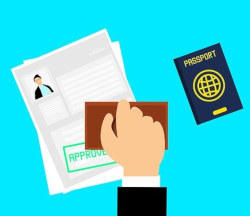Feb 032021
 After four long years, Brexit has finally happened, and we are becoming increasingly aware of how it is going to change all our lives, from holidaymakers who love to visit France, to homeowners who love to stay for months at a time.
After four long years, Brexit has finally happened, and we are becoming increasingly aware of how it is going to change all our lives, from holidaymakers who love to visit France, to homeowners who love to stay for months at a time.
In this, the first of a two-part guide, we’ll look at visiting France and the 90/180 rule, long-stay visas and French residence permits, and banking changes. In the second part we’ll cover changes to driving licenses, pet passports, health care, phones and roaming charges, British TV, and customs charges on goods bought from the UK.
Holiday Homes, Travel And The 90/180 Rule

Schengen Area
Member states
Countries de facto participating
Members of the EU legally obliged to join the Schengen area in future
British travellers to the EU and Schengen Area will already have noticed changes, including additional checks at ports of entry, and further entry restrictions due to the Covid 19 pandemic. But now we are non-EU, or third-country citizens, we are obliged to follow Schengen Area rules of stay under the visa-free regime, which means that we can only stay for a maximum of 90 days for every 180 days.
Anyone who overstays may face deportation and/or entry bans, but as there is no common policy, some member states may be harsher than others. Almost every deported person will face difficulties travelling back to the Schengen Area, however, with prolonged border checks and the risk of being turned back.
If a traveller has overstayed by a long time, they could even be banned from entering for three years or more, unless they can prove that they couldn’t travel for a good reason, such as hospitalisation, in which case they may not be subject to such penalties.
The rule means that, should you stay in your holiday home for three months between January and March, you cannot enter any other EU country until the beginning of July.
How is the 90/180 rule checked? The European Travel Information and Authorization System, or
ETIAS, is an electronic system that will keep track of visitors from countries who do not need a visa to enter the Schengen Zone. It resembles the U.S Electronic System for Travel Authorization (ESTA), and is expected to be in place later this year.
Although British citizens will not need a visa to visit Europe, they will need an ETIAS visa waiver from 2022. The registration process will be fully online and an approved ETIAS authorisation will be valid for 3 years, or until your passport expires.
If you own a second home in France but are not registered as a resident, you are subject to this rule, but if you have a residence permit, or Carte de Séjour, the 90/180 days of stay rule will not apply to you.
The Long Stay Visa: Visa Long Séjour valant Titre de Séjour (VLS-TS)
 If you would like to stay in France for more than 90 days, you need to apply in advance for a long-stay visa, valid between three months to one year at this website: https://france-visas.gouv.fr/en_US/web/france-visas/
If you would like to stay in France for more than 90 days, you need to apply in advance for a long-stay visa, valid between three months to one year at this website: https://france-visas.gouv.fr/en_US/web/france-visas/
This is equivalent to a Schengen visa, and enables you to move around the Schengen Area outside France as per the 90/180 day rule outlined earlier.
If you are sure that you won’t be staying in France for more than a year, you can apply for a Visa Long Séjour Temporaire (VLS-T). This may be the best solution for second home-owners, but a new application will be needed each year.
The most common long-stay entry visa is similar to a residence permit, and is called a Visa Long Séjour valant Titre de Séjour (VLS-TS).
There are several different types, including:
- If you are not proposing to work or set up a business in France: Visa de Long Séjour valant Titre de Séjour – Visiteur
- If you are proposing to set up a business in France: Visa de Long Séjour valant Titre de Séjour – Entrepreneur/Profession Libérale
- If you have salaried employment: Visa de Long Séjour valant Titre de Séjour – Salarié
You must arrive in France within three months of the issue date of your visa, and must then validate your VLS-TS within three months of your arrival. If you don’t, you will no longer be legally present in France and will be unable to re-enter the Schengen Area.
The validation procedure is now completely online at the following website:
https://administration-etrangers-en-france.interieur.gouv.fr/particuliers/
You will need to provide:
- The information on your visa
- The date on which you entered France
- Your residential address in France
- Your credit card details to pay for the appropriate residence permit
If you would like to stay in France for longer than the validity of your VLS-TS, you’ll need to apply for a residence permit at your local prefecture within the two months before your visa’s expiry date.
Permanent Residence: Carte de Séjour Pluriannuelle
 To obtain a Carte de Séjour Pluriannuelle, or permanent residence, you will have to follow an integration process, called Republican Integration Contract (CIR), which includes a basic language test. You will have up to two years to complete the requirements of the contract, which may involve enrolling in the government offered French language classes.
To obtain a Carte de Séjour Pluriannuelle, or permanent residence, you will have to follow an integration process, called Republican Integration Contract (CIR), which includes a basic language test. You will have up to two years to complete the requirements of the contract, which may involve enrolling in the government offered French language classes.
After five years’ legal residence in France, you can apply for more permanent residence (Carte de Résident de Longue Durée-UE Etranger en France Depuis 5 Ans), which is valid for ten years. It is, however, subject to certain conditions regarding income and health insurance. It will allow you to stay in other EU countries for more than three months.
Following that, you can you apply for a permanent residence permit (Carte de Résident Permanent d’un Etranger en France), which is not subject to any further conditions relating to income or health insurance.
Banking Changes
 As a result of Brexit some British banks are closing the current accounts of holders living in the EU, while some credit card operators now require a UK address to continue.
As a result of Brexit some British banks are closing the current accounts of holders living in the EU, while some credit card operators now require a UK address to continue.
The reason behind this is the loss of European-wide ‘passporting’ permissions, which allowed banks to operate across the continent. Following Brexit, banks now have to comply with the rules of each individual EU country, and some, including Lloyds and Coutts, are choosing to pull out as a result.
If you have lost, or face losing, your UK bank account, alternatives include switching to digital account providers, while some currency exchange services now offer multi-currency accounts that function like international bank accounts. For savings, most of the larger UK building societies offer online-based international bank accounts, offering interest and lower fees.
In Part Two, we’ll look at changes to driving licenses and pet passports, as well as health care, changes to phones and roaming charges, British TV and customs charges when ordering goods from the UK.










